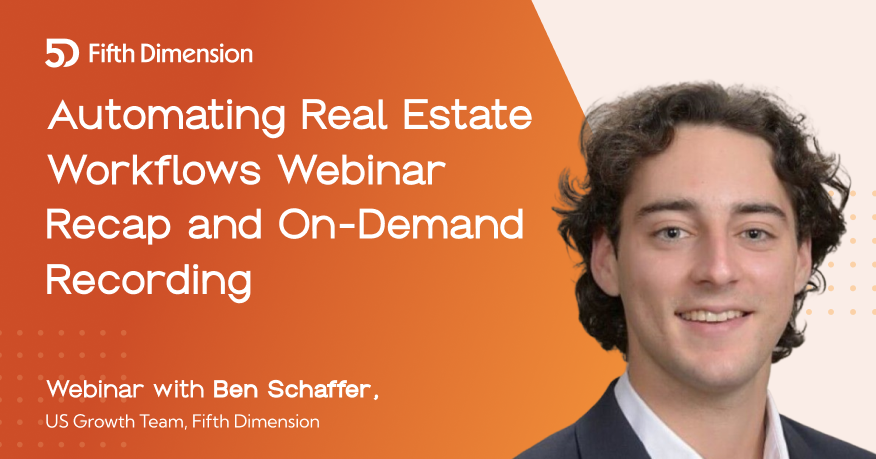What everyone gets wrong about enterprise AI security
A lot of the concern around AI security is focused in the wrong place. While executives debate whether their data is safe, the real question is whether they understand what they're actually buying.
Oscar Thorne spends much of his time helping real estate professionals and c-suites understand the same core idea. As Entrepreneurial Commercial Leader at Fifth Dimension, he talks to real estate executives who all seem to have the same concerns about AI security. And they all have the same misconceptions.
"The biggest misunderstanding I hear from prospects about AI security is that it's all the same," Oscar says. "Once you give access to your data it's there for the world to see. All of the clients data is shared and all of the learning models are shared too."
It’s a belief that has become pervasive across the industry. Real estate companies are making decisions about enterprise AI based on experiences with consumer platforms and it's creating a strange situation where everyone thinks they understand the risks but few actually do.
Why early AI platforms created confusion about data safety
The issue started with early AI platforms like ChatGPT and the original Microsoft Copilot, which weren't transparent about how data was handled or processed. Users had no clear sense of whether their information was secure or how it might be used, creating uncertainty and mistrust.
These platforms weren't designed for the real estate industry, but they became many professionals' first exposure to AI. Because of this, many believe all AI solutions follow the same process.
It's a classic case of first impressions sticking. The entire AI category was painted with the same brush, even as enterprise-grade solutions emerged with fundamentally different approaches to data handling.
Given the sensitivity of real estate data, it's understandable to question whether your data is in safe hands. That's what's different about Fifth Dimension, which has built its platform specifically to address these enterprise security concerns and mirrors those of widely trusted enterprise tech platforms, like Salesforce or major financial institutions.
These organisations set high industry standards, standards that Fifth Dimension matches through independently audited security measures, strict data isolation and ongoing compliance monitoring.
How Fifth Dimension keeps your data private and protected
Fifth Dimension’s approach is based on the idea that your intellectual property belongs exclusively to you and is the foundation of your success. 5D implements strict security measures so that each client's data remains entirely confidential, private and unaffected by how other clients use the platform.
Technical implementation comes down to what Oscar calls sandboxing. "Each customer's data sits in its own dedicated, isolated workspace which we call a 'sandbox', meaning your files and documents are kept completely separate from those of other clients."
It’s common with cybersecurity experts, who emphasise that isolating customer environments reduces the risk of a data breach. According to the IBM Cost of a Data Breach Report 2024, data segregation helps limit the scale of breaches and speeds up recovery. Security specialist Bruce Schneier also highlights that sandboxing prevents data leakage between clients – a major concern for enterprises – aligning directly with best practice security guidance.
Everything, be it searches, file storage, or automated workflows, runs inside a private environment. "All searches happen within your private sandbox, so searches and actions in one customer's area can’t reach or reveal data from any other customer's account," Oscar says.
Even the AI models themselves remain separate. Oscar continues, "All of our learning models are in a dedicated client sandbox environment. Ultimately the more a customer uses Fifth Dimension the better it understands you and has no impact on any other client."
Fifth Dimension backs its architecture with security measures designed to hold up under pressure. Data is encrypted using AES-256 when stored and protected by SSL/TLS while moving between systems. The platform is monitored continuously and regular independent penetration tests help catch problems before they ever reach production.
What SOC 2 and ISO 27001 mean for your business
For enterprise buyers, vendor claims need verification. "Both ISO and SOC 2 serve as independent, internationally recognised proof that a company's information security and data protection practices meet rigorous standards. As a result, enterprise clients have confidence that their data is managed and protected using industry best practices, not just internal claims.
Security experts agree that SOC 2 and ISO 27001 certifications matter when choosing an AI provider. According to Deloitte, SOC 2 certification is considered essential because it proves data protection standards have been independently checked. Likewise, ISO 27001 provides clear evidence that a company follows internationally trusted practices for managing and safeguarding information.
These aren't just badges to display on websites either. 5D holds both ISO and SOC 2 certifications, representing the highest standards of security. Achieving and maintaining these certifications involves ongoing audits and continuous compliance monitoring so clients always have full confidence in the platform’s security.
Oscar says, “In truth, if you are engaging with any AI company that doesn’t put these processes in place, you should be questioning them. Ultimately they are not taking security seriously enough”.
How 5D handles compliance for the UK and US
Compliance for UK and European clients
If your business operates in the UK or Europe, GDPR sets strict rules about how your data needs to be stored and processed. At Fifth Dimension, all EU and UK client data stays within the European Economic Area, fully meeting GDPR requirements around residency and transfers. We only use your personal data exactly how you instruct us to. It won't be used to train AI models without your explicit consent and it's never shared with other clients or third parties.
Compliance for US clients
For our US-based clients, your data stays securely within our US data centres, protected by industry-leading SOC 2 and ISO 27001 standards. Again, these certifications offer complete transparency, tight controls and robust security, which is exactly what you'd expect when trusting a provider with your most sensitive business information.
Here's a quick breakdown of the key security measures Fifth Dimension has in place:
What happens to your data if you leave?
"Clients have full control over their data and can request data export at any time during their contract or within 30 days after termination," Oscar notes.
In a typical scenario, if a real estate investment manager decides not to renew their contract, they simply notify Fifth Dimension and request a data export before the subscription ends. 5D then delivers all requested content in the desired format, confirms the deletion timeline and securely deletes the client’s data to provide documented confirmation to the client.
Security never stops improving
Security continually evolves and Fifth Dimension regularly conducts internal and external audits to review and enhance technical controls, operational practices, incident management and change management processes.
It's an arms race that never ends, which is why the certification and audit processes matter so much.
How integrations actually work
When it comes to connecting with existing systems, Oscar points to established integrations: "We've already established integrations with pretty much every major document management platform, Box OneDrive etc – it's just a matter of turning the lights on when we onboard a new customer. All access control and permission settings are mirrored."
This means Fifth Dimension maintains your existing security protocols while enhancing your capabilities with AI.
Competitive timing
While executives debate security, the technology continues advancing. The firms that understand the difference between consumer AI and enterprise AI are already capturing advantages. The question for the rest of the industry is how long they'll let misconceptions about AI security prevent them from evaluating what's actually available.
As Oscar puts it, enterprise security isn’t the sticking point. The technology exists. The frameworks work. What’s less clear is whether decision-makers truly understand what they’re evaluating when comparing platforms, or what matters most in the context of their own risks.
Book a chat to understand what enterprise AI security actually looks like.





.svg)